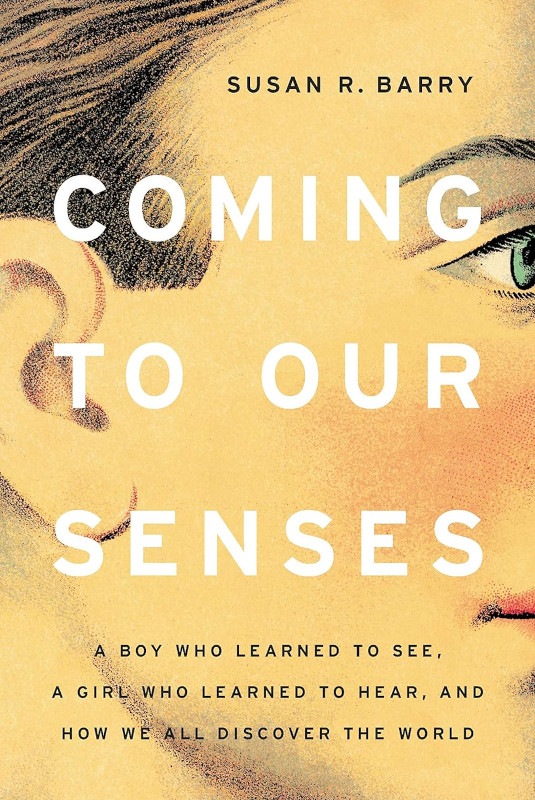Coming to our Senses

What would it be like to see clearly after a childhood of near blindness? Or to hear for the first time? Since understanding what we see and hear comes so naturally to most of us, we assume that our senses developed spontaneously in infancy—that gaining sight or hearing later in life would be like turning on a light switch or a sound system. In fact, nothing could be further from the truth. The real story is far more interesting and inspiring, with much to teach us all about the way that we perceive the world.
In COMING TO OUR SENSES: A Boy Who Learned to See, a Girl Who Learned to Hear, and How We All Discover the World (Basic Books; June 8, 2021), I draw on the stories of two remarkable young adults to show how our brains process raw stimuli into meaning, why 'gaining a new sense' requires a fundamental reorganization of the brain, and how our past experiences and personal predilections influence our future observations and growth. While adapting to a new sense after childhood is immensely difficult, it's not impossible—in the same way that adult athletes continue to train after their brains and bodies are mature, it is possible to become an “athlete of perception.”
Liam McCoy was 15 when a surgical procedure addressed several conditions that had left him nearly blind since early childhood. But instead of seeing his family, friends, and everyday objects within a three-dimensional landscape, he saw a hodgepodge of lines and colors on one flat plane. Zohra Damji was 12 when a cochlear implant enabled her to hear for the first time. But all sounds—voices, a car motor, the rain—merged into one unintelligible cacophony.
A decade later, McCoy and Damji have adapted to their new sense and are both accomplished young adults; Damji is the first deaf person to earn a medical degree in her native Tanzania, a feat which required her to learn a second language. Having come to know each of them and their families very well, and having experienced my own late-life sensory awakening (as chronicled in my first book, Fixing My Gaze, and by Oliver Sacks in The Mind's Eye), I was able to tell their stories from both a scientific and personal perspective. I hope COMING TO OUR SENSES invites readers to “see” themselves in a whole new way.
Praise
“Absolutely fascinating.”—Temple Grandin
“What would happen if you had a new sense grafted on your body? Sue Barry is alert to the many fascinating details of how Liam and Zohra navigated their new sensory experiences, essentially giving the reader a lab course in experimental philosophy. This moving work of biography and scholarship explores the deep questions that arise when people choose to live in bodies that have been made new and strange.”—Michael Chorost, author of, Rebuilt: How Becoming Part Computer Made Me More Human
“Coming to Our Senses is an engaging and illuminating book. Barry's intimate account of people who gained the ability to see and hear as adults offers rich insights into how we shape, and our shaped by, our senses. Along the way Barry teaches us much about vision, hearing and the human capacity to and adapt.”—Dennis M. Levi, UC Berkeley
“Neurobiologist Barry (Fixing My Gaze) explores sight, hearing, and perception in this triumphant survey of people who gained a sense they were born without. Barry skillfully balances scientific explanations with empathetic stories of how senses shape the human experience”…This powerful tale is as thoughtful as it is informative.”—Publisher's Weekly
“Through stories of two amazing individuals, a neurobiologist explains how we see and hear…Even science savvy readers will find surprises in this insightful exploration of how two humans learned a new sense.”— Kirkus
“In telling the detailed stories of how Liam and Zohra learned to navigate the world using their new senses — stories that in many ways mimic the way able-bodied infants accomplish the same thing — Barry gives us insight into what it means to be human.”—New York Times
Coming to Our Senses, by neurobiologist Susan Barry, explains how our actions shape and reshape our senses throughout our lives, delving into this deeply personal developmental process.”—New Scientist
“While researching the fascinating and inspiring story of a boy and a girl — born blind and deaf, respectively — who learned to see and hear after receiving surgical intervention, Barry, a neurobiologist who herself gained sight in both eyes in midlife, arrived at a new theory about the nature of perception.”—Toronto Globe & Mail
“Barry, who spent over a decade getting to know these two incredible people, profiles them with detail and compassion, unraveling their stories through both personal and scientific lenses. The result is a book that reveals the ways in which scientific knowledge is profoundly tied to our understanding of human nature… Fascinating.”—The Wesleyan Connection
“Interweaving McCoy and Damji's accounts with scholarly investigations of how perception works, Barry celebrates her subjects' determination to adapt to their newfound senses.”—Smithsonian Magazine Online
“Barry’s compassionate, nuanced, and observant exposition is informed by her own experience…One strength of the book is the depth of her connection with both McCoy and Damji.” —The MIT Technology Review
Media